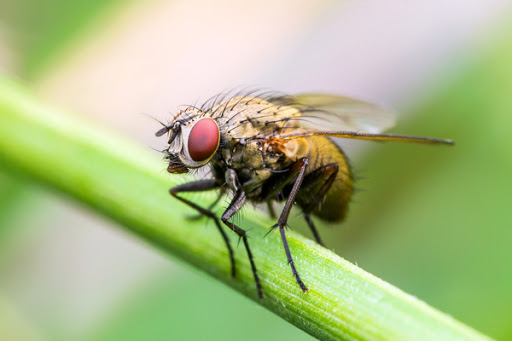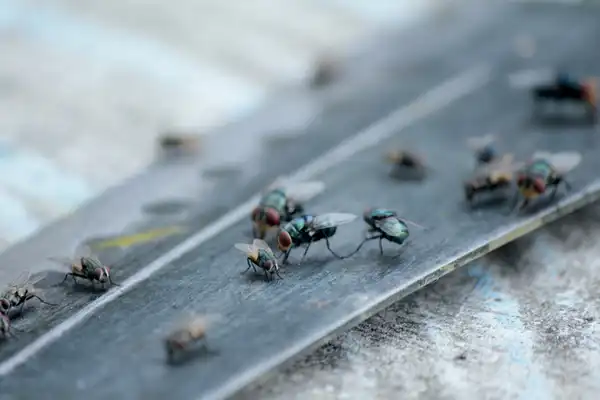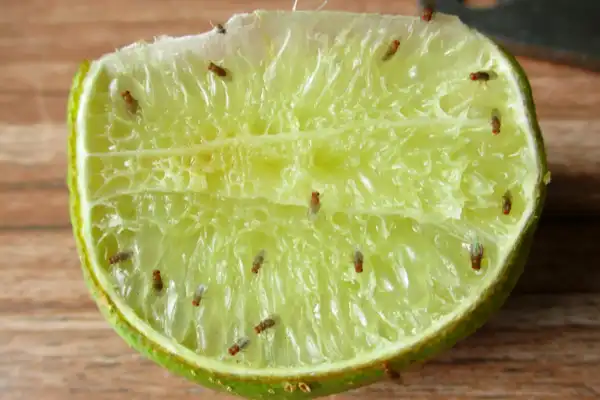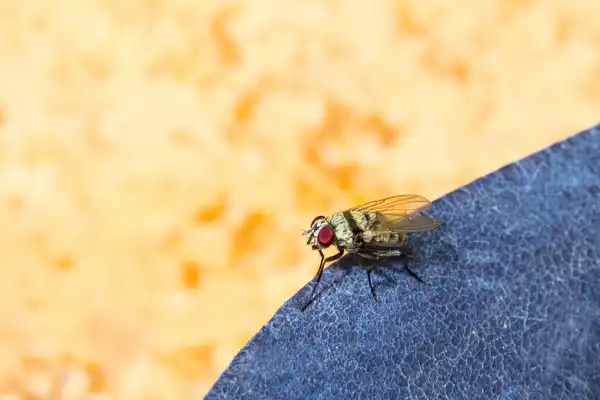How long a fly lives depends on its species and the temperature of its environment. In warm, humid environments with plentiful food, flies could live as few as 15 days. In cool, dry environments, fly development tends to take longer.
The faster flies grow, the faster they lay eggs. The faster they lay eggs, the more flies they produce! There are four common flies in Michigan: house flies, fruit flies, cluster flies, and phorid flies. Here’s how to figure out which fly you have and what to do about them:
Which flies do I have?
House flies
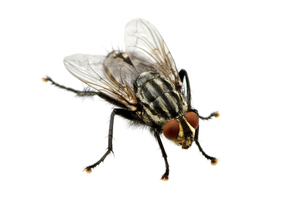
House flies (Musca domestica) are the most common fly infesting most homes. These flies are ⅛ to ¼” long, with grey bodies, red eyes, and four dark stripes.
Female house flies lay eggs directly inside organic matter whenever possible. Inside your home, you’ll probably find these flies around trash bags, dumpsters, or dirty water. House flies make a distinctive buzzing noise when flying.
Fruit flies
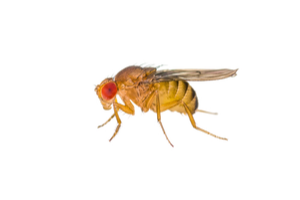
Fruit flies (Drosphila melanogaster) are around ⅛” long, tan, and have large red eyes. They lay their eggs in the moist film that develops on food and beverages as they ferment.
Inside, you’ll find them near fruit, vegetables, garbage, and water. They’re especially common in kitchens, garbage disposals, open bottles and cans, and around mops and cleaning rags.
Cluster flies
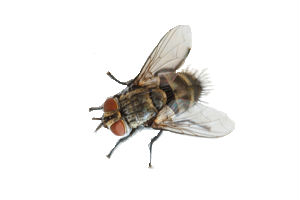
Cluster flies (Pollenia rudis) look similar to house flies, but they’re slightly larger. Adult cluster flies are dull-grey with black markings. They also have yellow hairs on their thorax, which made give them a golden sheen.
Cluster flies bury their eggs in the soil so larvae can feed on earthworms. You may see them clustered around your windows and doors, especially during the fall.
Phorid flies
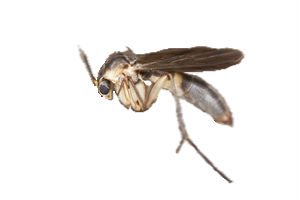
Phorid flies (Phoridae) resemble fruit flies, but they have long legs and lack the fruit flies’ red eyes. They’re about ⅛” long and translucent tan. Unlike other flies on this list, Phorid flies are not particularly competent fliers.
They travel mostly by “scuttling” along surfaces. They feed and nest on decaying organic matter and stagnant, dirty water. They’re especially common around plumbing leaks.
How long do flies live?
House flies
In warm conditions, house flies complete their developmental cycles in as few as seven to ten days. During that time, house flies undergo complete metamorphosis with egg, larval, maggot, pupal, and adult stages. Adults usually live 15 to 25 days, but they could live for up to two months. House flies can reproduce immediately upon reaching adulthood and a single female fly can produce up to 3,000 eggs.
Fruit flies
In optimal conditions, fruit flies can advance from egg to adulthood in only eight to ten or ten to twelve days. They undergo embryo, larva, and pupal stages before reaching adulthood. Adults usually live around 30 additional days after metamorphosis. They reproduce immediately after reaching adulthood, and females can lay eggs 24 hours after mating. Each female fly can lay up to 500 eggs in her lifetime.
Cluster flies
Cluster fly development takes between 27 to 39 days. These flies go through egg, larvae, pupal, and adult stages. Adults lay eggs in the soil. Hatched larvae develop in earthworms. Flies don’t appear above ground until they’re fully developed. Adult cluster flies live longer than most flies and may overwinter in homes. Some cluster flies may live for up to one year.
Phorid flies
A Phorid flies’ complete life cycle could take only fourteen days under optimal conditions. A single female phorid fly can lay up to 500 eggs in her lifetime. These eggs hatch within 24 hours. The resulting larvae feed for 8 to 16 days and then pupate into adults quickly. Flies can reproduce and restart the cycle as soon as they reach adulthood.
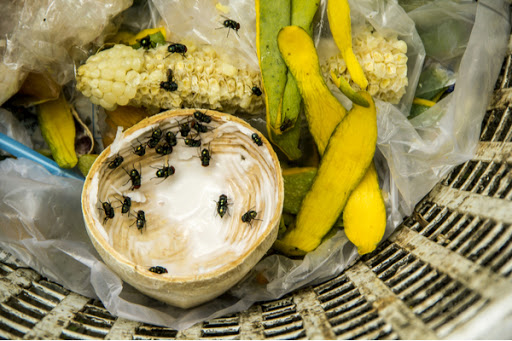
How do I keep these flies out of my home?
Flies are attracted to decaying organic material. House flies, fruit flies, and phorid flies seek out fermenting liquids and rotting food. Cluster flies live near rotting logs and stumps or dying weeds and grass that attract earthworms. Rinse out containers before throwing them away. Keep garbage and recycling in sealed plastic bags. Take out your garbage and recycling every night. Clean out your garbage cans and dumpsters frequently.
Most the flies on this list are also attracted to moisture and humidity, especially near food. Flies are great at finding and exploiting plumbing leaks, condensation, and other sources of excess moisture. Look for leaks, condensation, dripping fixtures, and run-off in your kitchen, basement, and attic. Fix leaks, seal drafts with caulk, and clean up puddles and other water sources. Clean dirty drains and other sources of food or water back up, inside and outside.
As flies establish themselves, they’ll lay eggs, spread out, and entrench themselves in your home. Unfortunately, however, it can also be difficult to stop a fly infestation before it’s bad. Especially if they’re reproducing this quickly! Luckily, even if flies have established themselves in your home, you don’t have to put up with it.
If you have a fly problem, give Griffin Pest Solutions a call any time. Our experts will identify your fly, find its nests, wipe it out, and keep it from getting in again.

